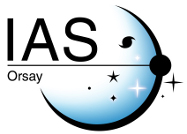Implications of bias evolution on measurements of the integrated Sachs-Wolfe effect: errors and biases in parameter estimation
| Titre | Implications of bias evolution on measurements of the integrated Sachs-Wolfe effect: errors and biases in parameter estimation |
| Type de publication | Journal Article |
| Year of Publication | 2009 |
| Auteurs | Schaefer, BM, Douspis, M, Aghanim, N |
| Journal | Monthly Notices of the Royal Astronomical Society |
| Volume | 397 |
| Pagination | 925-932 |
| Date Published | Aug |
| ISBN Number | 0035-8711 |
| Numéro d'accès | WOS:000268100700028 |
| Résumé | The subject of this paper is a quantification of the impact of uncertainties in bias and bias evolution on the interpretation of measurements of the integrated Sachs-Wolfe (ISW) effect, in particular on the estimation of cosmological parameters. We carry out a Fisher matrix analysis for quantifying the degeneracies between the parameters of a dark energy cosmology and bias evolution, for the combination of the PLANCK microwave sky survey with the EUCLID main galaxy sample, where bias evolution b(a) = b(0) + (1 - a)b(a) is modelled with two parameters b(0) and b(a). Using a realistic bias model introduces a characteristic suppression of the ISW spectrum on large angular scales, due to the altered distance-weighting functions. The errors in estimating cosmological parameters if the data with evolving bias is interpreted in the framework of cosmologies with constant bias are quantified in an extended Fisher formalism. We find that the best-fitting values of all parameters are shifted by an amount comparable to the statistical accuracy: the estimation bias in units of the statistical accuracy amounts to 1.19 for (m), 0.27 for Sigma(8) and 0.72 for w for bias evolution with b(a) = 1. Leaving b(a) open as a free parameter deteriorates the statistical accuracy, in particular on (m) and w. |



